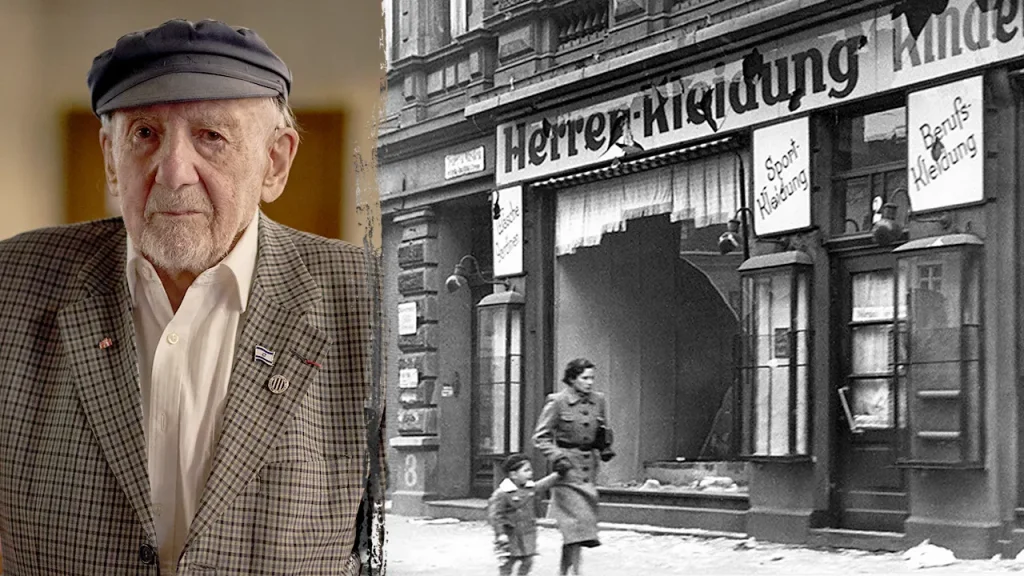101-Year-Old Holocaust Survivor Draws Alarming Parallels Between Now and Nazi Germany
Walter Bingham has lived through more than a century of history, but the memories of Kristallnacht—the “Night of Broken Glass”—remain painfully vivid. Now 101 years old, Bingham sees disturbing similarities between today’s world and the Nazi Germany he fled as a teenager. His perspective offers both a sobering warning and a ray of hope as antisemitism surges globally in the wake of the Israel-Hamas war.
At age 14, Bingham witnessed the horror of Kristallnacht on November 9-10, 1938, when violent mobs destroyed Jewish businesses, homes, and places of worship throughout Germany. During this orchestrated wave of violence, Nazis burned over 1,400 synagogues, vandalized thousands of Jewish-owned businesses, and invaded Jewish homes. The destruction wasn’t just material—approximately 26,000 Jewish men were arrested and sent to concentration camps simply because of their identity. This pogrom marked a pivotal escalation in the persecution that would ultimately lead to the Holocaust. For young Walter, these events shattered any remaining sense of security for Jews in Germany, forcing many, including himself, to recognize the mortal danger they faced under Nazi rule.
“We live in an era equivalent to 1938, where synagogues are burned, and people in the street are attacked,” Bingham told The Associated Press. His comparison isn’t made lightly. Recent events lend credence to his concerns. Last October, a terrorist attack targeted Jewish worshippers outside the Heaton Park Hebrew Congregation in Manchester, killing two men. In Melbourne, Australia, a synagogue was set ablaze in an act condemned as antisemitic by the country’s prime minister. These incidents echo the systematic violence Bingham witnessed as a youth, raising alarm bells for the centenarian who recognizes the patterns of escalating hatred.
The statistics reinforce Bingham’s concerns. According to the Anti-Defamation League, the United States alone recorded 9,354 antisemitic incidents in 2024—a 5% increase from the previous year. More alarmingly, this represents a 344% surge over the past five years and an 893% increase over the last decade. “Antisemitism, I don’t think, will ever fully disappear because it’s the panacea for all ills of the world,” Bingham observed. This persistent hatred has shown remarkable resilience throughout history, adapting to new social contexts while maintaining its core prejudice. The dramatic spike in antisemitic incidents following October 7, 2023, demonstrates how quickly latent antisemitism can resurface during times of geopolitical tension, particularly involving Israel.
Despite these troubling parallels, Bingham identifies a crucial difference between now and then. “In those days, the Jewish mentality was apologetic,” he explained. “Please don’t do anything to me, I won’t do anything to you.” The Jews of pre-war Europe largely lacked political power and were often isolated within their host societies. Many hoped that by maintaining a low profile or assimilating further, they might escape persecution. This approach proved tragically ineffective against the Nazi regime’s systematic campaign of extermination. Today, Bingham sees a fundamental shift in this dynamic, one that gives him hope despite the rising tide of hatred.
“Today, we have, thank God, the state of Israel, a very strong state,” Bingham said. This represents the most significant change from the 1930s. While antisemitism continues to increase globally, Bingham firmly believes “the one thing that will not happen would be a Holocaust, because the state will see to it” that such atrocities are prevented. The existence of Israel as a Jewish homeland provides both a physical refuge and a powerful deterrent against the kind of systematic persecution that nearly eradicated European Jewry. At 101, having witnessed both humanity’s darkest chapter and the subsequent rebirth of Jewish sovereignty, Bingham offers a perspective that spans the dramatic arc of 20th-century Jewish history. His testimony serves as both a warning about the persistent nature of antisemitism and a reminder of how drastically circumstances have changed for the Jewish people since his youth.


